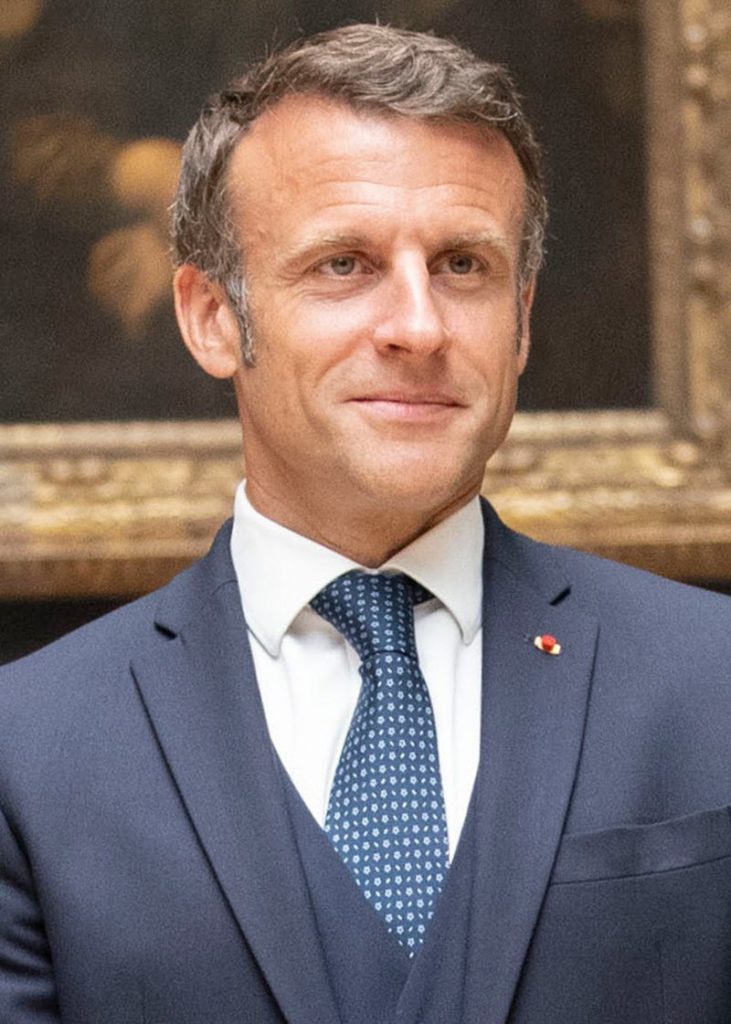On May 7, 2017, Emmanuel Macron was elected President of France. Prior to embarking on politics, Macron had an established career in civil service and investment banking.

As president, Macron has championed pro-business economic policies and a strong pro-European Union stance. As a staunch proponent of the European Union and a representative of the centrist liberal political spectrum, Macron has pursued an aggressive agenda of economic reform and European unity. In January 2024, Macron appointed Gariel Attal as prime minister, the first openly gay man to hold that office in France.
President Macron has made a significant impact on French politics, the French economy, and international relations. His presidency is a source of ongoing debate, with diverse views on his governance style, his economic policies, and his alignment with international bodies.
Despite the inevitable controversy, Macron’s influence on both French and European politics remains undeniable, and his tenure continues to shape France and its future in significant ways. Whether his vision will lead France towards prosperity or add to its challenges, the time will tell.
Macron’s Early Life and Career
Emmanuel Macron was born in Amiens, France on December 21, 1977. He is the son of Françoise Macron (née Noguès), a physician, and Jean-Michel Macron, professor of neurology at the University of Picardy. Macron´s parents divorced in 2010.
Macron grew up with two sibblings; Laurent (b. 1979) and Estelle (b. 1982).
Macron was baptised a Catholic at his own request at the age of 12, despite growing up in non-religious family. Today, he identifies as agnostic Catholic.
His early life was characterized by academic excellence. He studied philosophy at the University of Paris-Ouest Nanterre La Défense, eventually earning a master’s degree in Public Affairs from the Institut d’Études Politiques de Paris (Sciences Po). He graduated from the École nationale d’administration in 2004.
Macron did not perform military service, since he was pursuing his graduate studies. He belonged to the last cohort of French men for whom military service was mandatory.
Before his entry into politics, Macron had a successful career in the civil service, where he worked as an Inspector of Finances—a prestigious position within the French state apparatus. He later moved to the private sector, working for the investment bank Rothschild & Cie.
Macron’s Political Journey
Macron began his political career as a member of the Socialist Party, where his pro-business stance was often at odds with his colleagues. He was a member of the Socialist Party from 2006 to 2009.
He was the Minister of Economics, Industry and Digital Affairs under President François Hollande from 2014 to 2016, and then Deputy Secretary-General to the President from 2012 to 2014.
During his time as Appointed Minister of Economics, Industry and Digital Affairs for the second Valls government in 2014-2016, Macron helmed a number of business-friendly reforms. In August 2016, he resigned from this position to launch his own presidential campaign.
Marcon is a founding member of the centrist political party Renaissance. He ran in the 2017 presidential election on the banner of En Marche, a centrist and pro-European political movement founded by him in April 2016.
The 2017 election
In 2017, Macron defeated Marine Le Pen of the National Front in the presidental election, becoming the youngest president in French history. His victory was viewed as a blow to populist movements within Europe, with Macron’s pro-European Union stance symbolizing a rejection of nationalist trends.
Macron topped the ballot in the first round of voting, partly as a result of the Republican nominee François Fillon becoming embroiled in the Fillon affair. Macron was elected President of France on 7 May, with over 66% of the vote in the second round, defeating Marie Le Pen by a broad margin.
In the 2017 legislative election in June Macron’s party, now renamed La République En Marche! (LREM), secured a majority in the National Assembly.
The 2022 election
The 2022 presidental election resulted in President Macron being elected to a second term, once again defeating Le Pen of the National Front.
In the 2022 legislative election, Macron’s centrist coalistion lost its absolute majority, resulting in a hung parliament and the formation of a minority government. This was the first French minority government since 1993.
President Macron’s Economic Policies
President Macron has promoted pro-business reforms, including cuts in corporate taxes, easing labor laws, and promoting start-ups. Although these policies created an image of France as a ‘start-up nation,’ they have been criticized by labor unions and groups representing workers’ rights.
Protest against Macron´s reforms marked his first years of presidency, culminating with the Yellow Vest Protests in 2018-2020.
Macron’s substantial pension reforms have also drawn a lot of criticism. In 2023, the French government raised the retirement age from 62 to 64, which resulted in public sector strikes and violent protests.
Macron’s Foreign Policy
- In his foreign policy, Macron has remained firmly pro-European Union, striving to strengthen the union and restore France’s position in it.
- He is generally seen as a proponent of a form of globalism that respects national identities.
- Macron has held a stringent stance against terrorism, and continued Opération Chammal in the war against the Islamic State.
- During the China – United States trade war, macron conducted €42 billion in trade and business agreements with China.
- In 2022, Macron joined the international condemnation of the 2022 Russian invasion of Ukraine.
Personal life
Family: Emmanuel Macron has been married to Brigitte Trogneux since 2007. She has three children from a previous marriage, but Macron has no children of his own. In August 2017, the family adopted Nemo, a black Labrador Retriever-Griffon dog who lives with them in the Élysée Palace.
Languages: In addition to his native French, Macron is fluent in English.
Activities: He enjoys skiing, tennis and boxing. Macron plays the piano and is especially fond of the works of Franz Liszt and Robert Schumann.
Football: Macron is a supporter of Olympique the Marseille.
